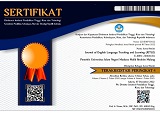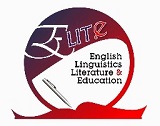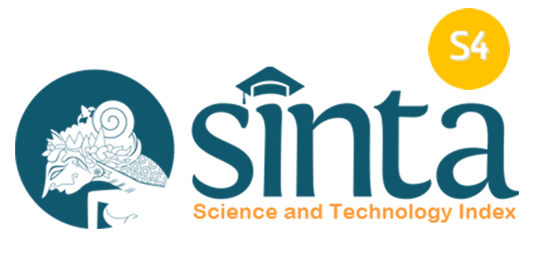The English Language Needs for Information Technology: A Comparison Case of Professionals and Students
Abstract
English has established itself as a global lingua franca. The global growth in the usage of English has resulted in many reforms within educational institutions. The study aims to ascertain and examine English needs for information technology purposes among professionals and learners on a wide scale. A quantitative descriptive approach with a survey research design was employed in the study, and it applied to the Cross-Sectional survey design. Mailed questionnaires were collected from 243 students’ and 23 professionals. According to the questionnaires, the result found that professional purposes for learning English are to complete written-project reports or papers, while students must communicate with the global community. The English learning outcome implied different aims. The professionals want to complete language instructions for information technology processing, but students expect information access to the products. Professional speaking abilities are concerned with asking clarifications in the group or personal meetings, yet students concern more in taking and receiving the phone calls. In the same manner as writing, professionals and students have the same expectation that is to produce formal reports in academic or professional situations. Both participants perceive the responses by reading ability concerned to the summarizing detail information. This study affirmed an interrelation between the English standing in professional IT and students’ IT positions in communication experiences in their present circumstances.
Keywords
Full Text:
PDFReferences
Abrar, M., Mukminin, A., Habibi, A., Asyrafi, F., & Marzulina, L. (2018). “ If our English isn’t a language, what is it?” Indonesian EFL student teachers’ challenges speaking English. The Qualitative Report, 23(1), 129–145.
Aeni, N., Jabu, B., Rahman, M. A., Ismail, H., & Bin-Tahir, S. Z. (2018). The students’ needs in maritime English class at ami aipi Makassar, Indonesia. Journal of Language Teaching and Research, 9(6), 1284–1292.
Andi, K., & Arafah, B. (2017). Using needs analysis to develop English teaching materials in initial speaking skills for Indonesian college students of English. The Turkish Online Journal of Design, Art and Communication (TOJDAC), Special Edition, 419–436.
Anthony, L. (2018). Introducing English for specific purposes. Routledge.
Anwar, K., & Arifani, Y. (2016). Task based language teaching: Development of CALL. International Education Studies, 9(6), 168–183.
Asrifan, A., Vargheese, K. J., Syamsu, T., & Amir, M. (2020). ESP course design: The need analysis on tourism department in Indonesia vocational high schools. Journal of Advanced English Studies, 3(2), 69–77.
Atmowardoyo, H., Weda, S., & Sakkir, G. (2020). Information technology used by millennial good English language learners in an Indonesian university to improve their English skills. Solid State Technology, 63(5), 9532–9547.
Balaei, P., & Ahour, T. (2018). Information technology students’ language needs for their esp course. International Journal of Applied Linguistics and English Literature, 7(2), 197–203.
Bolander, B., & Sultana, S. (2019). Ordinary English amongst Muslim communities in South and Central Asia. International Journal of Multilingualism, 16(2), 162–174.
Darmuki, A., Andayani, A., Nurkamto, J., & Saddhono, K. (2015). Model student learning to speak for education study language and literature Indonesia: document analysis and needs learning to speak. Prosiding Prasasti, 99–109.
Dirgeyasa, I. W. (2018). The need analysis of maritime English learning materials for nautical students of maritime academy in Indonesia based on stcw’2010 curriculum. English Language Teaching, 11(9), 41–47.
Farrell, T. S. C., & Jacobs, G. M. (2020). Essentials for successful English language teaching. Bloomsbury Publishing.
Fillmore, L. W., & Snow, C. E. (2018). 1. What Teachers Need to Know About Language. Multilingual Matters.
Grudeva, E. A., & Golovanova, N. I. (2015). English for specific purposes for technological specialties. Вестник АПК Ставрополья, 3, 237–240.
Hoa, N. (2016). Difficulties in teaching English for specific purposes: Empirical study at Vietnam universities. Higher Education Studies, 6(2), 154–161.
Hoffman, L., & Zollman, A. (2016). What STEM teachers need to know and do for English language learners (ELLs): Using literacy to learn. Journal of STEM Teacher Education, 51(1), 9.
Ibrahim, A. (2016). ESP needs analysis: a case study of PEH students, University of Khartoum. Sino-US English Teaching, 13(12), 905–923.
Indrasari, N. (2016). Project Based Learning in English for Specific Purposes (ESP) Course for Pre-Service Teacher. English Education: Jurnal Tadris Bahasa Inggris, 9(2), 366–379.
Jabbarova, A. (2020). Effective 21st century English language teaching styles. Архив Научных Публикаций JSPI, 1–4.
Mahboob, A., & Lin, A. M. Y. (2016). Using local languages in English language classrooms. In English language teaching today (pp. 25–40). Springer.
Malicka, A., Gilabert Guerrero, R., & Norris, J. M. (2019). From needs analysis to task design: Insights from an English for specific purposes context. Language Teaching Research, 23(1), 78–106.
McClain, J. B., Mancilla-Martinez, J., Flores, I., & Buckley, L. (2021). Translanguaging to support emergent bilingual students in English dominant preschools: An explanatory sequential mixed-method study. Bilingual Research Journal, 1–16.
Mohammadzadeh, S., Barati, T., & Fatemi, M. A. (2015). An investigation into the English language needs of bank employees of Saderat Bank in Mashhad. Theory and Practice in Language Studies, 5(8), 1695.
Muslem, A., Yusuf, Y. Q., & Juliana, R. (2018). Perceptions and barriers to ICT use among English teachers in Indonesia. Teaching English with Technology, 18(1), 3–23.
Nalliveettil, G. M., & Alenazi, T. H. K. (2016). The impact of mobile phones on English language learning: Perceptions of EFL undergraduates. Journal of Language Teaching and Research, 7(2), 264.
Pereira, N., & de Oliveira, L. C. (2015). Meeting the linguistic needs of high-potential English language learners: What teachers need to know. Teaching Exceptional Children, 47(4), 208–215.
Putri, N. E., Kher, D. F., Rani, Y. A., & Ramli, A. J. (2018). English for specific purposes: english language needs in hospitality and travel industry. IJMURHICA: International Journal of Multidisciplinary Research of Higher Education, 1(1), 1–17.
Rahman, M. (2015). English for specific purposes (ESP): A Holistic Review. Universal Journal of Educational Research, 3(1), 24–31.
Renandya, W. A., Hamied, F. A., & Nurkamto, J. (2018). English language proficiency in Indonesia: Issues and prospects. Journal of Asia TEFL, 15(3), 618.
Rossikhina, O. G., Ermakova, P. v, & Aleshchenko, O. A. (2019). Analysis of the English language needs of students at the Russian Technological University. RUDN Journal of Psychology and Pedagogics, 16(1), 88–100.
Songbatumis, A. M. (2017). Challenges in teaching English faced by English teachers at MTsN Taliwang, Indonesia. Journal of Foreign Language Teaching and Learning, 2(2), 54–67.
Syakur, A., Zainuddin, H. M., & Hasan, M. A. (2020). Needs analysis English for specific purposes (esp) for vocational pharmacy students. Budapest International Research and Critics in Linguistics and Education (BirLE) Journal, 3(2), 724–733.
Tsou, W. (2015). From globalization to glocalization: Rethinking English language teaching in response to the ELF phenomenon. English as a Global Language Education (EaGLE) Journal, 1(1), 47–63.
Wilches, J. A. U., Medina, J. M. O., & Gutiérrez, C. (2018). Indigenous students learning english in higher education. Íkala, Revista de Lenguaje y Cultura, 23(2), 229–254.
DOI: https://doi.org/10.18860/jetle.v3i1.12202
Refbacks
Jalan Gajayana 50 Malang 65144, Jawa Timur, Indonesia

This work is licensed under a Creative Commons Attribution-ShareAlike 4.0 International License.
Indexed by





